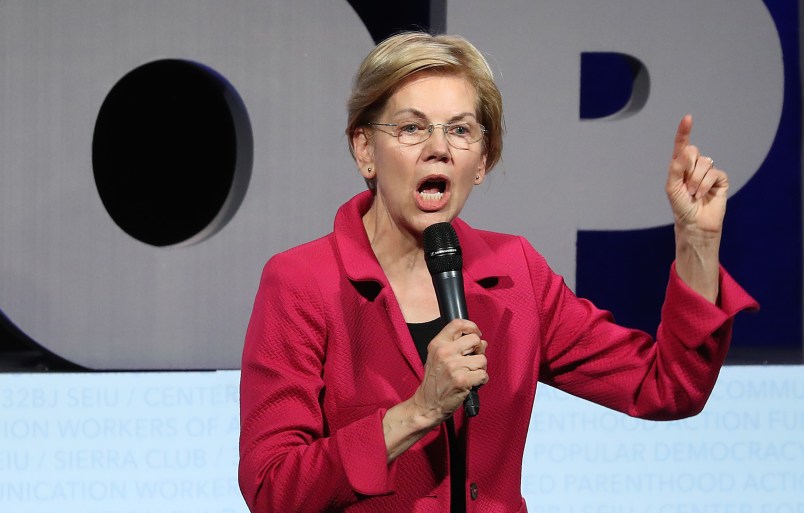Sen. Elizabeth Warren (D-MA) unveiled a major plank in her platform to tax the rich on Thursday, introducing plans for a new tax on all corporations that clear $100 million in annual profits.
Warren’s “real corporate profits tax” is aimed at large corporations like Amazon that have generated huge profits in recent years while almost entirely avoiding federal taxes through a series of loopholes and credits.
“Because of relentless lobbying, our corporate income tax rules are filled with so many loopholes and exemptions and deductions that even companies that tell shareholders they have made more than a billion dollars in profits can end up paying no corporate income taxes,” Warren wrote in a Medium post unveiling the plan. “Let’s bring in the revenue we need to invest in opportunity for all Americans. And let’s make this year the last year any company with massive profits pays zero federal taxes.”
The plan would institute a seven percent tax on profits over $100 million in addition to current taxes. An economic analysis released by Warren’s campaign estimated that at least 1,200 companies would be forced to pay new taxes under the plan, generating a net revenue boost of at least $1 trillion for the government.
Warren’s plan is aimed at large corporations — ones that have generally paid lower tax rates than smaller companies in recent years. The GOP tax cut law nearly doubled the number of publicly held companies that paid no federal taxes from 30 to 60 in the last year alone, according to a recent study from the left-leaning Institute on Taxation and Economic Policy.
This is the latest significant tax proposal the Massachusetts senator has unveiled as part of her campaign platform, which also includes a two percent surtax on people with more than $50 million in assets and a three percent surtax on those who have $1 billion.
The plans have earned her plaudits on the left and drawn concern from some more business-friendly moderate Democrats.
But so far, they haven’t proven a game-changer in the presidential race. Warren continues to struggle to siphon off a significant chunk of voters who backed Sen. Bernie Sanders (I-VT) last election, her natural base of support. She’s regularly polled in the mid- to upper-single digits in recent state and national polls, in the second tier of candidates.
And she raised just $6 million in her first quarter in the campaign, her team announced yesterday. That’s not a terrible haul in a crowded field, especially since she’s sworn off big donors, but it’s nothing compared to the huge sums she pulled in as a Senate candidate — and trailed even upstart South Bend Mayor Pete Buttigieg (D). She also spent almost all of that money, having built out a large staff in the early primary states with a high payroll.
And Sanders isn’t giving her much room on her left: He reintroduced a sweeping Medicare for all plan on Wednesday, which she cosponsored, a move that puts pressure on Warren and other Democrats to keep up as they try to woo the progressive wing of the party base.






